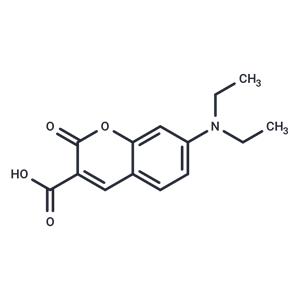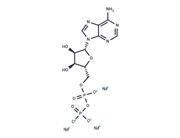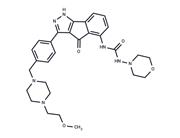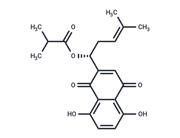| Name | 7ACC1 |
| Description | 7ACC1 (D 142) selectively affects a single part of the MCT symporter translocation cycle, leading to strict inhibition of lactate influx. This singular activity is associated with antitumor effects less prone to resistance and side effects. |
| Cell Research | Cervix cancer cells(SiHa and HeLa) and mammary cancer cells (MDA-MB-231, MCF-7) were cultured in Dulbecco's Modified Eagle Medium (DMEM), and HCT-116 colorectal cancer cells in McCoy's 5A medium, UM-UC-3 bladder transitional cell carcinoma and pharynx squamous carcinoma FaDu cells in Eagle's MEM, HL-60 acute promyelocytic leukemia cells and K562 chronic myelogenous leukemia cells were cultured in suspension in RPMI-1640 medium. For treatments, SiHa, Hela, and MDA-MB231 cells were seeded in flat-bottom 96-well plates in DMEM. After overnight incubation, the culture medium was replaced by 100 μL of medium containing 7ACC1, 7ACC2, AR-C155858, or 3BP. Nonadherent HL-60 and K562 cells were directly treated in flat-bottom 96-well plates in RPMI medium. Antiproliferative effects were determined using MTT or Presto Blue assay for adherent cells or cell counting using a Cellometer Auto T4 for nonadherent cells. |
| Animal Research | Eight-week-old NMRI female nude mice (Elevage Janvier) were injected subcutaneously with 2 × 106 SiHa cells, 2 × 10^6 HCT-11^6 cells, or 5 × 10^6 UM-UC-3 cells. An orthotopic breast cancer model was also used with MCF-7 tumor cells injected into the mammary fat pad of mice; a 17β-estradiol pellet had first been subcutaneously implanted in these mice as previously described . When tumors reached a mean diameter of 5 mm, 7-(Diethylamino)coumarin-3-carboxylic acid compounds (3 mg/kg) or AR-C155858 (3 mg/kg) were daily injected intraperitoneally; in some experiments, 7-(Diethylamino)coumarin-3-carboxylic acid treatment was combined with cisplatin (5 mg/kg) injected intraperitoneally at days 0 and 7 (7-(Diethylamino)coumarin-3-carboxylic acid administered daily except at days 0 and 7) or 3BP(3 mg/kg) injected i.p. from day 0 to 4 and day 7 to 11 (7-(Diethylamino)coumarin-3-carboxylic acid administered together with 3BP). Cisplatin and 3BP were also administered alone and control mice were injected with vehicle (dimethyl sulfoxide). Tumor sizes were tracked with an electronic calliper and determined using the formula: (length × width^2 × π)/6. |
| In vitro | 7-(Diethylamino)coumarin-3-carboxylic acid compounds on lactate influx using oxidative cancer cells known to maintain in vitro their capacity to take up lactate as an energetic fuel, and the lack of effects on lactate efflux using highly glycolytic cells. Accordingly, in oxidative human cancer cervix cells, SiHa and Hela, which express both MCT1 and MCT4 isoforms, a potent inhibition of both lactate influx and cell proliferation was obtained with 7-(Diethylamino)coumarin-3-carboxylic acid, whereas the bona fide MCT1/MCT2 inhibitor AR-C155858 failed to do so. The effects of 7-(Diethylamino)coumarin-3-carboxylic acid were confirmed in MCT1/4-expressing pharynx squamous FaDu tumor cells. These observations strongly suggest that 7-(Diethylamino)coumarin-3-carboxylic acid compounds are inhibitors of lactate entry through both MCT1 and MCT4 preventing any compensatory effects when MCT1, the main path for lactate uptake, is inhibited. |
| In vivo | 7-(Diethylamino)coumarin-3-carboxylic acid developed to selectively interfere with lactate fluxes in the lactate-rich tumor microenvironment.?The pharmacologic properties of two compounds of this family, including their effects on lactate influx and efflux and antitumor activity, were investigated using human cancer cell lines and mouse xenograft models.?Contrary to the reference MCT1 inhibitor AR-C155858, 7-(Diethylamino)coumarin-3-carboxylic acid unexpectedly inhibited lactate influx but not efflux in tumor cells expressing MCT1 and MCT4 transporters.?7-(Diethylamino)coumarin-3-carboxylic acid delayed the growth of cervix SiHa tumors, colorectal HCT116 tumors, and orthoptopic MCF-7 breast tumors.?MCT target engagement was confirmed by the lack of activity of 7-(Diethylamino)coumarin-3-carboxylic acid on bladder UM-UC-3 carcinoma that does not express functional MCT.7-(Diethylamino)coumarin-3-carboxylic acid?also inhibited SiHa tumor relapse after treatment with cisplatin.?Finally, we found that contrary to AR-C155858, 7-(Diethylamino)coumarin-3-carboxylic acid did not prevent the cell entry of the substrate-mimetic drug 3-bromopyruvate (3BP) through MCT1, and contributed to the inhibition of tumor relapse after 3BP treatment. |
| Storage | keep away from direct sunlight | Powder: -20°C for 3 years | In solvent: -80°C for 1 year | Shipping with blue ice. |
| Solubility Information | DMSO : 32 mg/mL (122.48 mM)
|
| Keywords | 7ACC-1 | Inhibitor | D1421 | inhibit | 7ACC1 | Coumarin D1421 | D-1421 | Coumarin D-1421 | Monocarboxylate Transporter |
| Inhibitors Related | BAY-8002 | AZD0095 | MCT1-IN-3 | Niflumic acid | D-Phenylalanine | AZD3965 | MSC-4381 | α-Cyano-4-hydroxycinnamic acid | 7ACC2 | AR-C155858 |
| Related Compound Libraries | Target-Focused Phenotypic Screening Library | Bioactive Compound Library | Membrane Protein-targeted Compound Library | Inhibitor Library | NO PAINS Compound Library | Bioactive Compounds Library Max | Ion Channel Targeted Library | Anti-Cancer Compound Library | Anti-Cancer Active Compound Library |

 United States
United States



